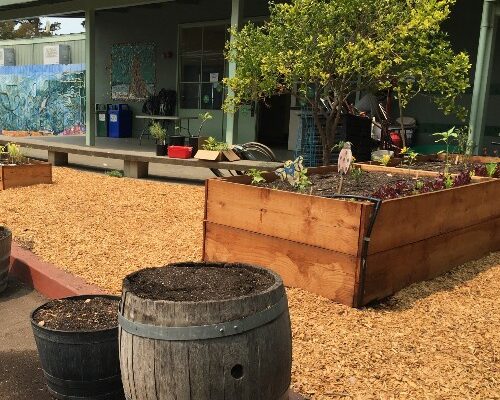
Activating School Gardens during COVID:
A Thriving Outdoor Learning Space at Joaquin Miller School in Oakland
January 2022
Introduction
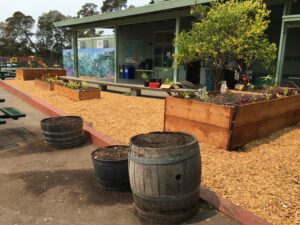 Thanks in large part to the leadership of two dedicated educators, Helene Moore and Kate Gallagher, the Joaquin Miller school community has been able to revitalize, sustain and actively engage their students in garden learning during the pandemic. In a recent conversation, Helene and Kate shared about the history, goals, student engagement and future aspirations for their school garden.
Thanks in large part to the leadership of two dedicated educators, Helene Moore and Kate Gallagher, the Joaquin Miller school community has been able to revitalize, sustain and actively engage their students in garden learning during the pandemic. In a recent conversation, Helene and Kate shared about the history, goals, student engagement and future aspirations for their school garden.
Helene has been a Technology Coordinator in Oakland since 1999. For the past 10 years she has integrated technology and hands-on NOAA Ocean Guardian environmental stewardship projects at Joaquin Miller Elementary. Last year she was involved in Oakland Teachers Advancing Climate Action and is currently coordinating a group of OTACA teachers at JM. Their focus is examining the potential positive effects of school gardens on wellness, environmental justice and climate change.
Kate also brings much experience to the project, having taught students K-5 in Oakland for 20 years. She retired in 2018 and is now focused on supporting teachers in environmental and climate change education, through OUSD’s Environmental and Climate Change Literacy (ECCL) Working Group, the Environmental Justice Caucus (EJC), and Oakland Teachers Advancing Climate Action (OTACA).
Goals/Objectives
The garden team is excited for the opportunity to focus on…
- helping students understand that they are part of the natural world, and that we depend on healthy ecosystems for our own health and well-being.
- cultivating a sense of wonder about natural processes – the growth of a seed, the role of decomposers, how animals and plants interact with each other in food webs.
- engaging students in outdoor learning experiences
History
When schools closed at the beginning of spring of 2020 due the pandemic, the Joaquin Miller community took the opportunity to rebuild and revitalize their school garden which had been neglected for a number of years. Parents, students, teachers and community members started by repairing and rebuilding many of the garden’s raised beds and enriching the depleted soil.
Next, to make space for new plants, they donated a bunch of existing succulent plants to anyone who was interested in having some.
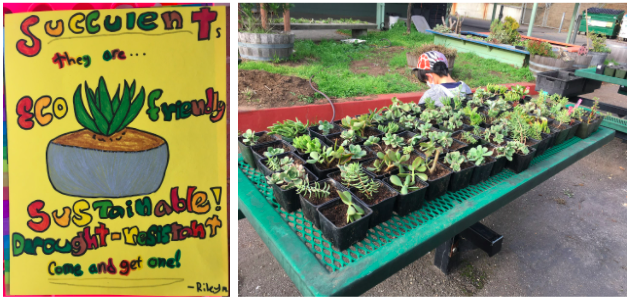
Then they began the process of planting new plants in the garden beds and engaging students in learning opportunities.
Student Engagement
The team has been very creative in finding ways to safely engage students in the garden. Kate leads gardening classes on Zoom once a month, as an optional activity for classes on Fun Friday. Teachers can join the Zoom with their students, and learn about such topics as worm composting, pumpkin seeds and sorting cafeteria waste to keep compostable waste out of the landfill.
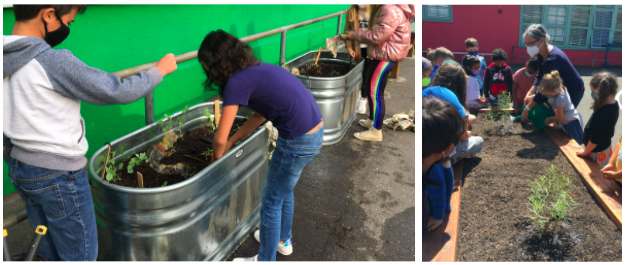
In addition, the team has found ways to connect to bigger topics, including climate change. Students are encouraged to Rethink, Refuse, Reduce, Reuse, Recycle, in an attempt to Repair our Earth. First-graders planted narrow leaf milkweed to learn how it supports the life cycle of the monarch butterfly. Students will learn more about the importance of butterflies and other pollinators, and the native plants they need to survive.
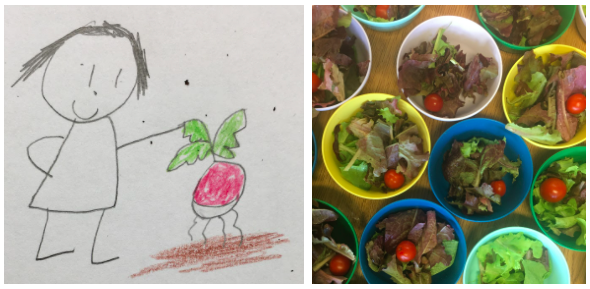
Aspirations and Next Steps
The Joaquin Miller Garden Team has a number of aspirations. This year the garden project motivated 5 teachers to sign up for Helene’s OTACA garden group, which will give them opportunities to share their experiences with OTACA teachers in other schools.
In addition, to help recycle green waste and build healthy soil, they are interested in creating a more robust and sustainable composting system.
Finally, they would also like to further support overall school beautification by finding other areas of the campus where garden expansion is possible.
Final Thoughts
School gardens provide a great way to get students outside to observe processes that generate many questions. Students can experience a very fulfilling feeling of taking care of living things and see that they are having a positive impact on their local environment every day. Do you have a garden story that you’d like to share? Please email the CRS Team!
Resources
Interested in learning more? The Community Resources for Science recommends exploring a number of related projects including the following: